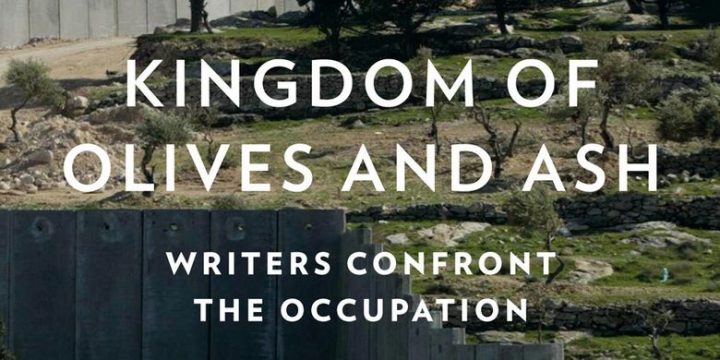Kingdom of Olives and Ash, edited by Michael Chabon and Ayelet Waldman, 2017, HarperCollins Publishers, 448 pages
The “land of milk and honey” generally refers to the promised land of Jewish tradition. As a notion, it denotes a land of peace and plenty. In sharp contrast to this placid image is the reality of the “kingdom of olives and ash” where conflict has been raging for more than fifty years, causing untold suffering, penury and destruction. Ayelet Waldman and Michael Chabon, after more than a quarter of a century of hesitation, decided to go there to see for themselves and then report to the world at large.
“We didn’t want to write or even think, in any kind of sustained way, about Israel and Palestine, about the nature and meaning of occupation, about intifadas and settlements, about whose claims were more valid, whose suffering more bitter, whose crimes more egregious, whose outrage more justified.” Michael Chabon
When they finally did go, they took with them a motley crew. Ayelet was born in Jerusalem but was primarily raised in the United States and Canada, the daughter of immigrants from Montréal. She lived and studied in Israel on and off over the years. For Michael, it was his first time in Israel. They were accompanied by twenty-four writers covering all continents except Antartica, of different ages and with eight mother tongues. Some of the writers identified as Christian, Muslim, Jewish and Hindu, while others claimed no religious affiliation whatsoever. You might recognize many of them: Lorraine Adams, Geraldine Brooks, Michael Chabon, Lars Saabye Christensen, Maylis de Kerangal, Anita Desai, Dave Eggers, Assaf Gavron, Arnon Grunberg, Helon Habila, Ala Hlehel, Fida Jiryis, Prochista Khakpour, Hari Kunzru, Rachel Kushner, Eimear McBride, Colum McCann, Eva Menasse, Emily Raboteau, Taiye Selasi, Raja Shehadeh, Madeleine Thien, Colm Toibin, Mario Vargas Llosa, Ayelet Waldman and Jacqueline Woodson.
In Chabon’s words, they were able to have “a clear, visceral understanding of just what the occupation meant, of how it operated, and of the decades of Israeli strategic planning that had gone into creating the massive, often brutal, always dehumanizing military bureaucracy that oversees and controls it.” In his introduction to this collection of essays, Chabon categorically states that writers’ contributions were not edited or censored nor did anyone receive any payment for them. He also explains that “all royalties from the sales of Kingdom of Olives and Ash, after expenses, will be divided between two NGOs: Breaking the Silence and Youth Against Settlements.
It is impossible to sum up the impressions of different writers in one simple sentence, or for that matter, in a book review, but some of the comments made by writers selected at random will give readers a general idea:
♦ There is a quiet loveliness to the people of Palestine. Jacqueline Woodson in “One’s Own People”
♦ Administrative detention—imprisonment without charge or finite term—is among the most feared of the spectres stalking everyday Palestinian life. The Fourth Geneva Convention, the finest flower of the Nazi defeat, strictly and explicitly forbids it, except under the most extraordinary circumstances. Michael Chabon in “Giant in a Cage”
♦ In Italo Calvino’s Invisible Cities, places are folded inside other places. Cities are not what they appear to be, but also what they are subjected to: memory, history, desire, forgetfulness, dream. […] In Israel and Palestine, I thought often of Calvino’s seen and unseen places, where the horizontal and vertical axes of history and place bend into the space-time of memory and desire.
[…]
The conceptual, legal, and physical infrastructure of occupation aims to entrench separation, disaffiliation, and, most profoundly, estrangement. Madeleine Thien in “The Land in Winter”
♦ Then: I don’t know how many articles I wrote, lectures I gave, and manifestos I signed in those years opposing this caricatured vision of Israel, and affirming that it was a pluralistic and democratic society.
[…]
And now: I am very critical of this policy not only because it seems to me right to be so, but also because I feel that the ever more colonialist bias of recent governments—I am referring to the governments of Sharon and Netanyahu—may be terribly prejudicial to Israeli democracy and the future of the country. Nothing degrades the political life of a nation more than sliding down a nationalist or colonialist path. Mario Vargas Llosa in “Journey to the West Bank”
♦ We have arrived, we are told, at the village of Susiya. The dust stirred by our vehicle settles. We look around—and see nothing. Where is the village Susiya? Here is only dust, stone, rubble, and the white heat of the sun.
[…]
Blink, and you will see the caves where people once lived but have been bulldozed, smashed, their entrances blocked with rocks. So now there is only a blue tarpaulin or two, held up by sticks. Anita Desai in “Visible, Invisible: Two Worlds”
♦ Silence in regard to the inherent immorality of the regime of occupation—which both oppresses Palestinian society and corrupts Israeli society—is rampant in Israeli society and, to a certain degree, in the international community. Michael Chabon in “Afterword”
It is difficult not to agree with Chabon.











